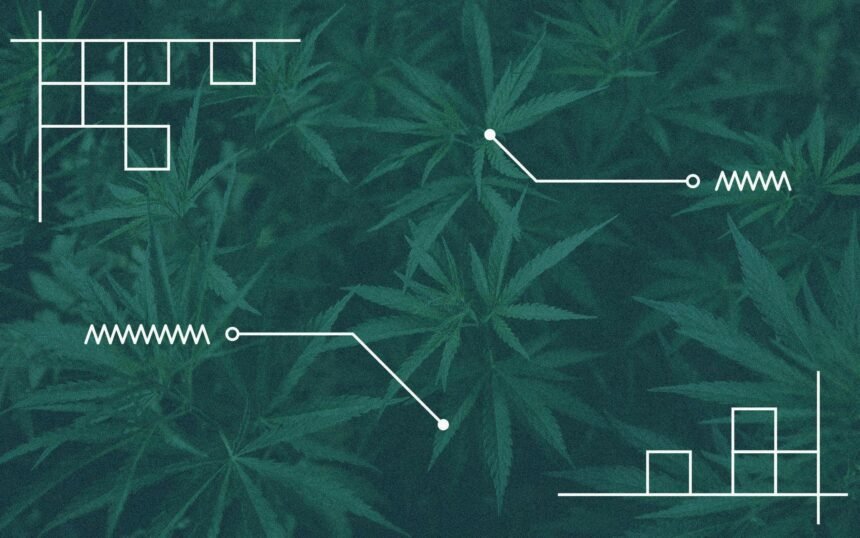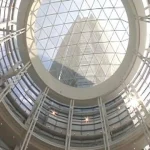Across the state, on storefronts and in bodegas and convenience stores, Texans are increasingly spotting products—vape juice, gummies, and even beverages—purporting to contain THC. These are not to be confused with the also-proliferating number of edibles and drinks containing CBD—the quaint cannabinoid meant to engender feelings of relaxation. These THC product labels tout true, mind-altering effects. The robust selection can leave the average Texas shopper to ask: Did grass suddenly become legal in this state, leaving a great big chunk of us unaware?
No, “marijuana,” as defined by recent legislation, is illegal for recreational use in the state of Texas, even though medical use was legalized in 2015.
Still, Texans are consuming legal cannabinoid products, including THC, and getting kinda high in the process. In fact, cannabis may be on its way to outpacing wine’s economic impact in the state; the cannabis industry in Texas generated between $19.1 billion to $22.4 billion in economic activity in 2022, with wine generating around $20 million in that same time period.
And weed’s popularity in the state, in the form of the legal cannabinoids and products described below, has caught the attention of Texas politicians. Lieutenant Governor Dan Patrick has signaled his interest in banning certain hemp-derived products in the 2025 legislative session.
To understand where marijuana’s legality stands, read on for our big green guide to cannabis use in Texas.
The Basics
What is weed anyway?
To understand the various cannabis components, and their legality, it’s helpful to define the terms in play. Cannabis refers to the plant that grows either marijuana or hemp. Weed is simply a slang term for the plant.
Marijuana is defined by federal law as a cannabis plant with more than 0.3 percent of the psychoactive tetrahydrocannabinol, or THC. Marijuana as defined remains illegal for recreational use in Texas with possession of up to two ounces classified as a Class B misdemeanor, punishable by up to 180 days in jail and/or a fine up to $2,000.
Hemp, which is made from the same plant as marijuana, contains less than 0.3 percent THC. Hemp-derived products, including the cannabinoid CBD, were made legal in 2018 with the passage of the federal Farm Bill. In 2019 House Bill 1325 in Texas established guidelines for the production of hemp in the state.
If marijuana use is technically still illegal, how is it possible—legally—to get high in Texas?
The 2018 Farm Bill introduced a green rush of “cannabusinesses” offering hemp-derived CBD products (see definition below) that featured no potential for a mind-altering high. But in more recent years, hemp businesses have interpreted the federal Farm Bill’s language to allow for the sale of mind-altering products containing hemp-derived THC. (More on that below, under “The 0.3 Percent Rule.”) Because the law addresses the general legality of hemp products, it offers no age limit for the use of hemp-derived products. (Patrick is urging lawmakers to address the age issue in the next legislative session.)
Because it became necessary for police to test cannabis products to determine their THC content, the law also led to decriminalization of marijuana in several Texas cities. (See “Where is marijuana decriminalized?” for more.)
Compassionate use
The most clear-cut legal access to marijuana remains the state’s compassionate-use program, which allows Texans with certain doctor-certified conditions to access weed from licensed medical dispensaries. The Compassionate Use Act, passed in 2015, initially qualified Texans living with epilepsy, but was expanded in 2019 to include conditions such as Alzheimer’s, cancer, and Parkinson’s disease, and again in 2021 to include autism, Huntington’s disease, and PTSD, as well as other debilitating conditions.
Currently, the compassionate-use program serves 73,000 patients, according to leading medical marijuana dispensary Texas Original, but millions more Texans may qualify for one of the more than 150 eligible conditions.
“In pretty much every other state, the primary qualifying condition is usually chronic pain,” says Nico Richardson, CEO of Texas Original, the state’s largest medical marijuana provider. “Anecdotally, from all the patients that we serve, they’re typically treating symptoms of their condition. And the primary symptom people are treating is pain.”
One thing to note: despite the legality of medical use, a state law limits the strength of medical marijuana in Texas. Qualified users can access marijuana with up to 1 percent THC by weight.
The potency cap on Texas medical marijuana makes it difficult for dispensaries to create inhalable, faster-acting forms of marijuana, which, Richardson believes, may lead some eligible patients to explore the nonmedical forms of cannabis below.
Those products, though technically legal under the 2018 Farm Bill, are unregulated and untested. Because no organization oversees their sale, there’s no real way to confirm they contain what their labels claim. Medical marijuana, on the other hand, is subject to strict regulation and must be tested by a third party.
The 0.3 Percent Rule
Those who don’t qualify for medical marijuana use can still access mind-altering THC—it just has to be hemp-derived and, again, make up less than 0.3 percent of total dry weight of the hemp plant.
As the serving size of the cannabis deliverable (a gummy or seltzer for example) grows, so does the amount of THC in the product. A two-gram gummy then can deliver six milligrams of THC, an average starter dose for getting high.
Alternative cannabinoids
Scientists have now identified more than one hundred different cannabis derivatives, and some cannabis companies are experimenting with the psychoactive potential of some of these. Because the substances are not addressed in the 2018 Farm Bill, they remain unregulated, so buyers beware.
The following compounds can be found in the form of flower (or bud), gummies, seltzers, and vape juice across the state.
Delta-8
The chemical makeup of traditional THC is known as delta-9. That compound is addressed specifically in the 2018 Farm Bill legislation, and in House Bill 1325.
Delta-8, which isn’t specifically mentioned in either bill, is a related compound that can produce a slightly lesser high than delta-9 when inhaled or ingested (think a light beer versus an IPA). Though it occurs naturally in a cannabis plant, the majority of the delta-8 sold across the country is made via a chemical process.
In fact, delta-8 reached consumers because of a surplus of CBD products saturating the market after the 2018 Farm Bill. Though deltas 6, 10, and 11—other forms of the cannabinoid—also exist, delta-8 was the easiest to convert from CBD, and thus the cannabinoid became widespread.
As the cannabinoid became more widely available, its legality was contested across the country. In 2021, Texas lawmakers moved to ban the compound, but, after a filing by Austin-based cannabis company Hometown Hero, an injunction on the ban allowed its continued sale. In September 2023, Texas’s Third Court of Appeals upheld the injunction, and, to date, delta-8 remains available throughout the state.
Patrick recently signaled his intent to raise the issue of a delta-8 ban, and a ban on hemp-derived delta-9 products, in the next legislative session.
THCa
THCa is another cannabinoid that is nonpsychoactive in its naturally occurring form. It’s also legal in Texas.
Though technically not THC, THCa will transform into THC—and become psychoactive—when it “decarboxylates,” a process catalyzed when the compound is heated—or smoked.
CBD, CBG, and CBN
Cannabidiol, or CBD, is found in both marijuana (recreationally illegal) and hemp (legal), but is nonpsychoactive. Users and marketers of the compound tout the cannabinoid’s supposed benefits, from improving sleep to easing anxiety and chronic pain. Those claims have yet to be evaluated by the Food and Drug Administration.
Though lesser known than CBD, cannabigerol (CBG) and cannabinol (CBN) are purported to have similar healing properties.
HHC
Some cannabis businesses in Texas are now offering hexahydrocannabinol, or HHC, products to consumers. The semisynthetic cannabinoid is created by adding hydrogen atoms to traditional CBD to create a compound similar to THC. Like delta-8, however, HHC is presumed to give you a lighter high than traditional delta-9 THC.
THC-O
Like HHC, THC-O is synthetically created, meaning it doesn’t naturally occur in the cannabis plant. Created with the addition of acetate to a delta-8 or delta-9 compound, THC-O is reported to be more potent than other cannabinoids.
As of 2023, the U.S. Drug Enforcement Administration considers THC-O illegal because it is not naturally occurring and thus is not covered by the Farm Bill. The DEA did not address HHC in its statement or, for that matter, the retail forms of delta-8, which are also created chemically.
Where is marijuana decriminalized?
After hemp was legalized in Texas, the number of marijuana possession charges dropped by more than half in Texas. Given the array of legal hemp-derived products, it became necessary for police departments to test seized cannabis products, and some counties simply elected not to expend those resources.
Relatedly, voters in Austin, Denton, Elgin, Killeen, and San Marcos overwhelmingly elected to adopt official policies decriminalizing marijuana possession. In January, Attorney General Ken Paxton filed lawsuits against each of those cities for violating state law.
Will recreational marijuana ever be fully legal in Texas?
Richardson, of Texas Original, says the availability of hemp-derived THC and delta-8 “is full recreational legalization with no cap on licenses, no cap on what can be sold and to whom.” It’s understandable, then, that Texans are so confused about where cannabis stands in relation to the law.
But will state law ever officially recognize the legal loophole the Farm Bill created?
The explosion of supply of and demand in cannabis products in the state has created a strong lobbying effort on the part of cannabis suppliers. They have a large stake in any future delta-8 or -9 ban the Legislature considers and will fight to protect their interests.
For now, though, full legalization remains a distant possibility.
“I think eventually it will be fully legalized. Now, when that happens, who knows?” says Ben Meggs of Bayou City Hemp Co. and 8th Wonder Brewery in Houston. “But the hemp market’s here to stay. It’s not going anywhere.
“You can’t put the toothpaste back in the tube.”











